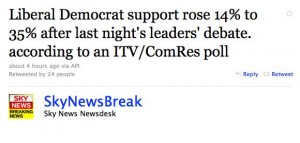Earlier today [Friday] media news sites, bloggers and tweeters reported that Liberal Democrats had leap frogged Labour with supporting rising by 14 per cent in a ITV/ComRes poll, to 35 per cent.
For example:

But this figure was soon amended and given some context. ComRes actually reports in its “final analysis” that Liberal Democrats remain in third place, with a cut of 24 per cent.
How did the misunderstanding occur?
ITN claims, in a statement to Journalism.co.uk: “A headline figure of the ComRes/ITV News poll was overheard by a journalist outside of ITV News.”
“Other media outlets ran with this information without verifying. The full figures were released in their full context almost immediately by ComRes and ITV News to all media.”
If you read ComRes’ press statement – published on the Independent’s blog here – it states:
The final analysis of the ComRes instant poll for last night’s ITV News at Ten among those watching the First Election Debate, extrapolated across the GB adult population as a whole, puts the Conservatives on 35 per cent, Labour on 28 per cent and Liberal Democrats on 24 per cent.
(…)
Of the 4,000 viewers sampled, before the poll was weighted across the population, their voting intentions are now Conservative 36 per cent, Labour 24 cent and Lib Dems 35 per cent.
(…)
[T]he national vote share result takes into account ComRes’s latest voting intention figures published on Wednesday 14th April and the voting intention of respondents who watched the debate polled on 15th April.
But it was the latter unweighted sample that caught the headlines, before being quickly updated when the full results were release.
According to the Telegraph’s Robert Colvile it was a case of “egg on pollster face”. But ComRes told Journalism.co.uk it only ever released the full results – with context and weighting.
ConservativeHome’s Jonathan Isaby blamed a tweet from ITV correspondent Lucy Manning (@lucymanning).
But she denied she was the first, and tweeted (in an open message to Guardian political journalist Andrew Sparrow): “Not true many more tweeted them before me. thought id clarify!”
Sparrow justifies sharing the initial poll results, acquired via Twitter, on Guardian.co.uk. He writes:
“Twitter is a wonderful source of information (if we didn’t use it, this blog would be slower and far less information) and the figures were released by journalists who are normally reliable. But on this occasion the information was misleading. I should have waited until I had spoken to ComRes before going into overdrive. I’m sorry about that.”
But weighting or no weighting, is the poll’s methodology sound? Journalist James Ball tweets that weighting a poll like that is “very problematic”.
“Not only is direct audience for debate small, it’s untypical of general population,” he claims. He says it’s “staggeringly poor methodology” for ComRes, “at a time rife for misinterpretation.”
Full ComRes press release:
The final analysis of the ComRes instant poll for last night’s ITV News at Ten among those watching the First Election Debate, extrapolated across the GB adult population as a whole, puts the Conservatives on 35 per cent, Labour on 28 per cent and Liberal Democrats on 24 per cent. This compares to the ComRes poll broadcast on ITV News at Ten on 14th April showing Conservatives on 35 per cent, Labour on 29 per cent and Liberal Democrats on 21 per cent.
Of the 4,000 sample of viewers who watched the debate, their voting intentions are now Conservative 36 per cent, Labour 24 per cent and Lib Dems 35 per cent. This compares to their stated voting intentions prior to the debate which stood at Conservative 39 per cent, Labour at 27 per cent and Liberal Democrat 21 per cent.
Methodology statement:
Instant Poll
ComRes interviewed 4032 GB adults on 15th April by an automated telephone survey immediately after the ITV1 Leaders’ Debate. Data were weighted to be demographically representative of all GB adults and weighted by past vote recall. Respondents were selected from a pre-recruited panel of people who agreed to be contacted by telephone following the leaders’ debates to give their views. ComRes is a member of the British Polling Council and abides by its rules. Full data tables will be available shortly at www.comres.co.uk.
National Voting Intention
To extrapolate the impact of the change in voting intention figures for viewers of the debates the national voting intention is modelled taking into account: (i) viewing figures for the debate (Peak of 10 million – approximately 21 per cent of the population); (ii) projected turnout –nationally and among viewers. Therefore, the national vote share result takes into account ComRes’s latest voting intention figures published on Wednesday 14th April and the voting intention of respondents who watched the debate polled on 15th April.
